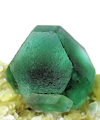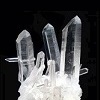| View previous topic :: View next topic |
| Author |
Message |
alfredo
Site Admin

Joined: 30 Jan 2008
Posts: 1014



|
 Posted: Apr 20, 2009 11:02 Post subject: Re: Baryte vs. Baryte Posted: Apr 20, 2009 11:02 Post subject: Re: Baryte vs. Baryte |
|
|
Jordi, a suggestion: Leave the current labels as they are; don't bother to rewrite them.
Future labels: When the mineral name is very similar in both languages (only terminal a/e difference), use english. When the names are different, like gypsum/yeso or phosphophyllite/fosfofilita, make a bilingual label with both names on it. I do it this way when I'm selling minerals in Japan, but I have to confess that I'm not consistent about it.
By the way, just for curiosity, do any dealers in Spain write labels in catalan? Do you ever see "atzurita" on a label, or is it always "azurita" at spanish shows? (I hope this question doesn't incite a civil war.)
Alfredo |
|
| Back to top |
|
 |
Jesse Fisher

Joined: 18 Mar 2009
Posts: 639
Location: San Francisco



|
 Posted: Apr 20, 2009 11:21 Post subject: Re: Baryte vs. Baryte Posted: Apr 20, 2009 11:21 Post subject: Re: Baryte vs. Baryte |
|
|
Hello Jordi,
You are in the business of selling mineral specimens for a living, so you must decide what works best for your customer base, which I am sure is quite international. One of the things I personally enjoy about the international nature of the mineral collector community is being able to learn something about other cultures and languages through our shared interests. While it is doubtful that I will become highly fluent in too many languages during my time, I enjoy learning things like the fact that in French "fluorine" means the mineral, not the element, and that the German name is "flusspat." In both cases the modern name "fluorite/fluorit" has superseded these traditional names but that doesn't look to have driven them from common usage.
I can see the need for some sort of standard language now that the whole world is potentially connected via the internet. Unfortunately for many, English seems to have become the "default" language. English is, however, quite a "mongrel" in that it is made up of bits and pieces of a number of other languages, without much apparent reason behind how it was done. I have no idea why we need "ph" to make the sound of an "f" and would happily vote to do away with it. After all, we've successfully changed "sulphur" to "sulfur," so why not the rest of it? Unfortunately, us English speakers do not have L'Acadamie to tell us how the language should be spoken and written, just the OED to record it. On the bright side, anyone unfamiliar with English will at least not be faced with knowing whether phosphophyllite is masculine of feminine.
All languages (at least those in common usage) are dynamic and changes in usage occur constantly, based on the current needs of those using it. Perhaps the fact that you feel the need to adopt a hybrid spelling on your labels so to make them more understandable to your non-Spanish customers is just another example of the sort of thing that causes languages to change.
Cheers,
Jesse |
|
| Back to top |
|
 |
Jordi Fabre
Overall coordinator of the Forum

Joined: 07 Aug 2006
Posts: 5089
Location: Barcelona



|
 Posted: May 06, 2009 03:37 Post subject: Re: Baryte vs. Baryte Posted: May 06, 2009 03:37 Post subject: Re: Baryte vs. Baryte |
|
|
Alfredo wrote:
>By the way, just for curiosity, do any dealers in Spain write labels in catalan? Do you ever see "atzurita" on a label, or is it always "azurita" at spanish shows? (I hope this question doesn't incite a civil war.)
Alfredo,
The Catalan-Spanish language's relationship is something very delicate and complex. As you can read so well Spanish language, I suggest to you to read this recent topic in the Spanish Forum: https://www.foro-minerales.com/forum/viewtopic.php?t=2323 and you will have a very clear idea about how is the situation currently.
Jordi |
|
| Back to top |
|
 |
Konstantinos Ch.
Joined: 12 May 2008
Posts: 23


|
 Posted: Mar 03, 2010 01:47 Post subject: Re: Baryte vs. Baryte Posted: Mar 03, 2010 01:47 Post subject: Re: Baryte vs. Baryte |
|
|
Hi all!
Sorry,I couldn't resist :)
Baryte is Latin.Comes from Greek .Baros in Greek means weight.Barys is male for heavy.
When a composite word (a word that consists of more than one words) is composed we use a term-element for the first word(s).
Respectively,Bar- is the term-element for Baros (weight) and Bary- is the term-element for Barys (heavy).
Bar-ium, a chemistry element that has high weight.
Bary-te,a mineral species that is heavy.
Why the confusion with Baryte?Just my opinion:
Y (called Ygrek in Latin or Greek "Y") and I are two letters that sound exactly the same in Greek language and in many other languages.
In Greek,the multiple different letter sharing the same sound help the reader understand which word a given word derives from and that's etymology. It's the way Greek has economy.
I feel the correct is Baryte.
All the best!
-Kostas. |
|
| Back to top |
|
 |
Gail

Joined: 21 Feb 2008
Posts: 5839
Location: Texas, Lone Star State.



|
 Posted: Mar 03, 2010 08:18 Post subject: Re: Baryte vs. Baryte Posted: Mar 03, 2010 08:18 Post subject: Re: Baryte vs. Baryte |
|
|
My British friends spell it Baryte, my American friends spell it Baryte. Bottom line is that I know what they are referring to. Communication is complete, no further action necessary.
_________________
Minerals you say? Why yes, I'll take a dozen or so... |
|
| Back to top |
|
 |
Carles Millan
Site Admin

Joined: 05 May 2007
Posts: 1538
Location: Catalonia



|
 Posted: Mar 07, 2010 10:35 Post subject: Re: Baryte vs. Baryte Posted: Mar 07, 2010 10:35 Post subject: Re: Baryte vs. Baryte |
|
|
| Gail wrote: | | My British friends spell it Baryte, my American friends spell it Baryte. Bottom line is that I know what they are referring to. Communication is complete, no further action necessary. |
Gail,
I am who started this topic just to solve a doubt I had. But in the end I agree with you. No matter one writes Baryte and others baryte. Many of us Catalans still use our traditional name "baritina", which is not standard, but everybody understands.
_________________
Al carrer Duran i Bas, si no hi vas no t'hi duran |
|
| Back to top |
|
 |
alfredo
Site Admin

Joined: 30 Jan 2008
Posts: 1014



|
 Posted: Mar 07, 2010 21:04 Post subject: Re: Baryte vs. Baryte Posted: Mar 07, 2010 21:04 Post subject: Re: Baryte vs. Baryte |
|
|
| Bolivians call it "baritina" too. |
|
| Back to top |
|
 |
Carles Millan
Site Admin

Joined: 05 May 2007
Posts: 1538
Location: Catalonia



|
 Posted: Mar 08, 2010 02:08 Post subject: Re: Baryte vs. Baryte Posted: Mar 08, 2010 02:08 Post subject: Re: Baryte vs. Baryte |
|
|
| alfredo wrote: | | Bolivians call it "baritina" too. |
Alfredo,
Glad to hear from you!
Although that name ("baritina") might not be nowadays scientifically correct, the Spanish, Romanian and Catalan Wikipedias still take it as the main name, being "barita" a side form. The Italian Wikipedia, however, considers "baritina" deprecated.
I remember saying and writing "baritina" all my life in my native Catalan until switching to "barita" rather recently, but I think in the Romance languages there is no possibility of using the letter "Y" in that name, as it is in British English and German.
_________________
Al carrer Duran i Bas, si no hi vas no t'hi duran |
|
| Back to top |
|
 |
Jesse Fisher

Joined: 18 Mar 2009
Posts: 639
Location: San Francisco



|
 Posted: Mar 08, 2010 11:29 Post subject: Re: Baryte vs. Baryte Posted: Mar 08, 2010 11:29 Post subject: Re: Baryte vs. Baryte |
|
|
| In French, it is "barytine." |
|
| Back to top |
|
 |
Tobi
Site Admin

Joined: 07 Apr 2009
Posts: 4250
Location: Germany



|
 Posted: Aug 21, 2010 06:50 Post subject: Re: Baryte vs. Baryte Posted: Aug 21, 2010 06:50 Post subject: Re: Baryte vs. Baryte |
|
|
| Carles Millan wrote: | | Hi! I'm not a native English speaker, so I start this topic only for informative purposes. Just to learn. I wonder why the most common species containing calcium is named calcite and the simpler mineral with magnesium is known as magnesite, but the same rule does not apply to barium: the barium sulphate is the baryte, with Y. Does anyone know the reason for breaking such rule? A rule that is not met by everybody... |
I know this topic is old but i just want to admit that German, like English, also breaks this "rule" of mineral nomenclature:
Antimon > Antimonit
Calcium > Calcit
Fluor > Fluorit
Magnesium > Magnesit
Mangan > Manganit
Molybdän > Molybdänit
Tellur > Tellurit
Titan > Titanit
Vanadium > Vanadinit
Wolfram (Tungsten) > Wolframit
but:
Barium > Baryt
(Even Superman has his Kryptonit in German ;-))
I even think that Baryt is the only mineral which's German name ends on -yt. Any of the other German collectors may correct me if i'm wrong.
Cheers! |
|
| Back to top |
|
 |
|




